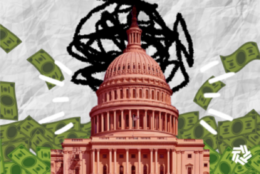transparency
-
Ginger McCall, associate director of the Electronic Privacy Information Center, says agencies need better FOIA regulations and a cultural change toward transparency.
June 12, 2014 -
The FOIA Act of 2014 would amend the Freedom of Information Act in 12 ways. It calls for the online portal and requires more oversight by agency inspectors general. But some agency FOIA officers say the bill only would improve the information disclosure process minimally.
March 19, 2014 -
The Center for Effective Government evaluated how well the 15 agencies that receive 90 percent of all Freedom of Information Act requests from the public process those requests. It found most of those agencies receive poor or failing grades in how they are implementing FOIA.
March 10, 2014 -
A new memo from CTO Todd Park requires agencies to update their open government plans by June 1. The plans should include new efforts as well as progress reports on current initiatives.
March 03, 2014 -
OMB Director Sylvia Mathews Burwell sent a memo to agency leaders outlining six steps they must take to make administrative information about everything from grantees to contractors to anything that is collected for the purpose of carrying out the basic administration of a program, such as processing benefit applications or tracking services received, more available internally and externally.
February 24, 2014 -
The Office of Management and Budget's markup of the Senate's version of the bill changes language around requiring data standards and how the information should be published. Open government advocates are concerned about OMB's suggestions.
January 27, 2014 -
A new Government Accountability Office report says greater transparency in the way the General Services Administration handles its high-value leases would lead to better decision making and generate more cost savings.
October 25, 2013 -
Despite progress by some agencies in processing FOIA requests, Patrice McDermott of OpenTheGovernment.org says its difficult to measure how open the government really is.
October 23, 2013 -
Pundits may question whether Congress should have approved $804 billion in stimulus money via the Recovery Act of 2009. But many in government have come to realize that the independent agency charged with overseeing how that money was spent -- the Recovery Accountability and Transparency Board -- has a lot to teach financial managers about ensuring transparency and rooting out waste in government spending.
April 10, 2013 -
The White House reaffirmed its commitment to an open and transparent government in President Barack Obama's second term. But government watchdog advocates say their frustration is growing with the slow and inconsistent progress agencies are making to make information more easily available.
January 18, 2013 -
The Environmental Protection Agency partnered with the Commerce Department and National Archives to launch a new online portal aimed at streamlining the Freedom of Information Act request process for both the public and federal agencies.
October 02, 2012 -
Walter Shaub Jr. said the STOCK Act could cause unintended consequences for federal employees' privacy and safety. Shaub said he favors revisions aimed at striking a balance between the need to protect personal information and the law's requirement to disclose stock trades.
July 23, 2012 -
While the Internet is a key priority for federal agencies to create economic prosperity, various rules set by regulatory agencies are hindering the fast-pace growth on the Web.
July 12, 2012 -
In its second report to the President, the Government Accountability and Transparency Board updates progress on several pilots to implement three broad-based recommendations. DoD and HHS are reviewing how best to standardize spending data. OMB is developing a Statement of Spending to provide more transparency into how agencies spend their funds.
July 10, 2012 -
President Barack Obama announced he will appoint Richard Ginman, the director of Defense Department procurement policy, to chair the Government Accountability and Transparency Board (GATB), a spending and transparency watchdog. Ginman has served as the director of Defense Procurement and Acquisition Policy (DPAP) for a little more than year.
July 05, 2012



